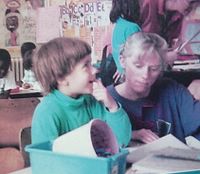
Relationship between teacher and learner vital.

For too long students have been told that the material they are being taught they will someday need in the future. As one writer says, it is a ‘just in case curriculum’. Every thing about school is based on this concept of preparation; ‘some day you will need this’. The school curriculum has become a nightmare of irrelevant 'hoops' designed by equally irrelevant technocrats for children to jump through. And teachers are becoming exhausted trying to ‘deliver’ and assess all the nonsense.
This future preparation premise is at best shaky. Early last century John Dewey wrote that the best preparation for the future is to live well today. If an unknowable future is not a sound idea, then what we need, is for schools to prepare students to deal effectively with the present.
What is required is an education process that is both interesting and challenging and one that involves students in in-depth meaningful investigations. And, echoing Dewey, they should learn in truly democratic environments. This cannot be achieved by a ‘one size fits all’ curriculum based on standardization. What we need to is to value diversity, creativity and innovative thinking; diversity breeds a source of richness for our community.
Educator Elliot Eisner believes that schools should teach a number of aims to prepare students to contribute to ensuring true democracy continues to develop, particularly if we want to encourage a sense community which is lacking today.
The aims he defines are:
Developing judgment: students learn judgment by having deal with problems that have more one correct answer. They need to be able to make choices and be able to give reasons for their decisions. The curriculum thus needs to be comprised of a series of problems to think about – and the best problems, as always, will be messy and ill defined.
The second aim would be to develop critical thinking about the big ideas facing humans today. Students need to be able to critique ideas and enjoy exploring what they can learn from them. They need to consider alternatives and choices and to construct their own understanding with the support of adults.
A third aim to achieve is meaningful literacy. Eisner sees this as more than literacy and numeracy but also how to make meaning and develop their talents in range of symbolic forms – music, the arts, physical skills and information media. Life is about making meaning and through exploring ideas and expressing their thoughts. Students in effect invent themselves by cultivating their minds.
A fourth aim is to develop collaborative learners. Students need to work together collectively, in harmony with arrange of cultural groups, utilizing each others individual skills . Too much current education is all about competitive solo performances.
A fifth aim is to develop in young people a sense of service by young people contributing to their own communities.
This education cannot be just imposed from the top - it needs to grow out of local concerns felt by those who lead our schools and our communities. Real education about real things for, and by, real people.
Just in time education?
4 comments:
I admire your persistance Bruce but don't you think there are too many vested interests who like things the way they are. The ideas you share would put them all out of work! Anyway while the children of the people with power do OK what will change? It is all about self- interest these days! Perhaps it always was.
The ideas you share above seem to work well in early education but are lost along the way.
What is 'lost along the way' is the passion for learning as students 'dis- engage' (the current jargon) from the system and their own learning.
Wordwide students are losing interest in education in the early years of secondary school.No wonder, they were never designed to cope with any but the so called academic students.
Things will change as we lose our Industrial Age mentality and begin to see education as a community concern - and not just a central government one.
Interesting, good to hear your observations again.
It seems such a fundamental thing. School's must respect the learners perspective in their learning.
How often are peoples recollections about their school experiences tales of lost opportunities.
'Lost opportunities' - that would seem to sum up education for too many students! And what's worse they didn't notice!
Post a Comment